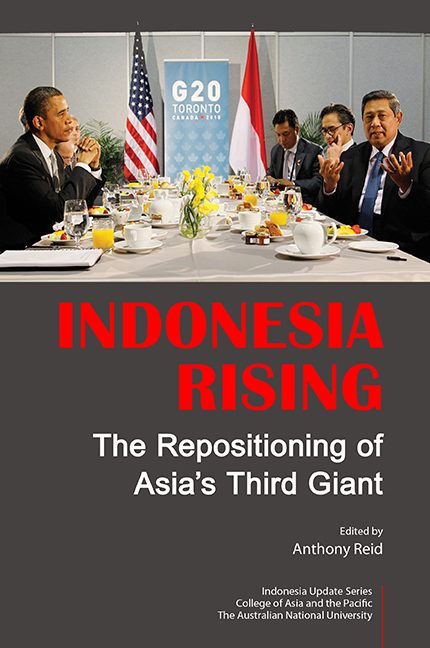Book contents
- Frontmatter
- Contents
- Tables
- Figures
- Contributors
- Foreword by Gareth Evans
- Preface
- Glossary
- 1 Indonesia's New Prominence in the World
- 2 Indonesia in the New World Balance
- 3 Indonesia's Role in the World Economy: Sitting on the Fence
- 4 Is Indonesia Rising? It Depends
- 5 Domestic Politics and International Posture: Constraints and Possibilities
- 6 Can Indonesia Lead on Climate Change?
- 7 Indonesian Muslims and Their Place in the Larger World of Islam
- 8 Indonesia's Quiet Springtime: Knowledge, Policy and Reform
- 9 Problems of Identity and Legitimacy for Indonesia's Place in the World
- Index
- INDONESIA UPDATE SERIES
1 - Indonesia's New Prominence in the World
Published online by Cambridge University Press: 21 October 2015
- Frontmatter
- Contents
- Tables
- Figures
- Contributors
- Foreword by Gareth Evans
- Preface
- Glossary
- 1 Indonesia's New Prominence in the World
- 2 Indonesia in the New World Balance
- 3 Indonesia's Role in the World Economy: Sitting on the Fence
- 4 Is Indonesia Rising? It Depends
- 5 Domestic Politics and International Posture: Constraints and Possibilities
- 6 Can Indonesia Lead on Climate Change?
- 7 Indonesian Muslims and Their Place in the Larger World of Islam
- 8 Indonesia's Quiet Springtime: Knowledge, Policy and Reform
- 9 Problems of Identity and Legitimacy for Indonesia's Place in the World
- Index
- INDONESIA UPDATE SERIES
Summary
‘GOODBYE CHINA, HELLO INDONESIA’?
Surprising as it sounds to cynical Indonesians and disillusioned Indonesianists, there are reasons for thinking that this is at last Indonesia's moment on the world stage. The world's fourth-biggest country by population has an unenviable reputation for not living up to expectations, epitomized by the subtitle of Anne Booth's economic history of Indonesia: ‘A history of missed opportunities’ (Booth 1998). She traced over almost two centuries a sequence of hopeful new beginnings followed by disappointments, leaving Indonesia one of the world's poorest and most conflicted countries in the 1960s. As other Asian tiger economies leapt ahead in the latter part of the twentieth century, Indonesia also grew, but failed to close the gap with its neighbours. In 1998 the Asian financial crisis caused a 13 per cent drop in GDP, and an IMF bullying of the Suharto government into taking the kind of stern medicine that helped precipitate its fall.
Yet now we have international pundits declaring that Indonesia is the future. The influential US journal Foreign Policy used the heading ‘The Indonesian tiger’ for a story proclaiming the country the quiet achiever of the moment (Keating 2010). Much quoted NYU Stern School economist Nouriel Roubini, known as ‘Dr Doom’ for his forecasting of global financial crisis and especially a coming crash in China, went further. In a speech reported under the heading ‘Roubini: goodbye China, hello Indonesia’, he noted that China's growth rate was falling while Indonesia's was rising (6.1 per cent in 2010, 6.3 per cent in 2011, 6.5 per cent expected in 2012). He argued moreover that Indonesia had the right model to sustain growth, with its low inflation, low debt (about 26 per cent of GDP), young demographics, and the insulation provided by two-thirds of its GDP being derived from domestic consumption. It therefore stood a better chance than China, let alone the developed world, of long-term growth even in the hard times he expected the world to face (Deutsch 2011). Indonesia's admission to the G20 club of influential states seems no more than its due in light of such predictions.
- Type
- Chapter
- Information
- Indonesia RisingThe Repositioning of Asia's Third Giant, pp. 1 - 13Publisher: ISEAS–Yusof Ishak InstitutePrint publication year: 2012



